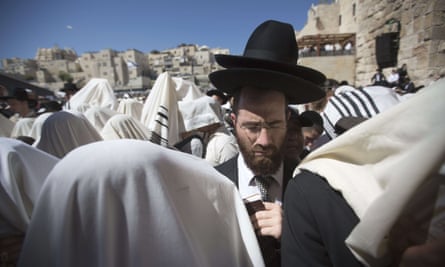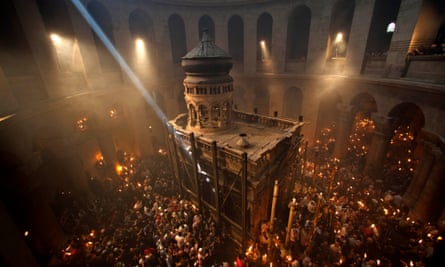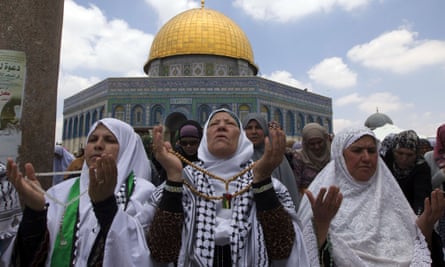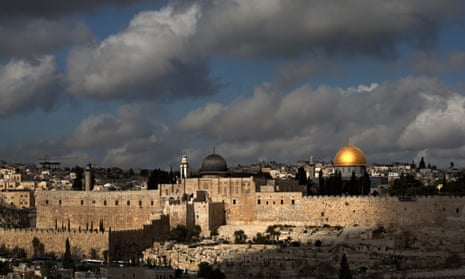Jonathan Romain: It is a religious concept that transcends time
For Jews, Jerusalem is not just a significant physical place in both past and present Jewish history, but is equally important as a religious concept that transcends time. The area itself had been traversed by the first Jew, Abraham (c1800 BCE), during his wanderings throughout “the Promised Land”. According to tradition, the place where Abraham nearly sacrificed his son Isaac but was commanded by God not to do so, was the spot on which Jerusalem was later built.
After the Israelites had gone to Egypt to avoid a famine, been enslaved and then returned to Israel, it was Jerusalem that David chose as his capital (c1,000 BCE). Thus it was a key part of the first kingdom of Israel. Jerusalem also became the religious hub, for it was there that his son, Solomon built the Temple, the national centre of worship. The heads of all Israelite households were enjoined to make a pilgrimage there three times a year to gather together for the three major festivals.
Such was the city’s importance in biblical times, that those who could not manage the journey there were advised to at least pray towards Jerusalem, in which case their prayer would be heard as if they were present. To this day, all synagogues face Jerusalem, so that our prayers are directed there in accordance with that tradition. When Jerusalem was destroyed – by the Babylonians in 586BCE and, after it was rebuilt, again by the Romans in 70CE – the sense of acute religious loss was expressed by adding a day of commemoration (Tisha B’Av) to the Jewish calendar, which is still observed.

Jews were in exile for the next 2,000 years, but kept Jerusalem’s memory intact as the symbol of national unity. As Psalm 137 declared: “If I forget you, O Jerusalem, let my right hand forget its cunning and my tongue cleave to the roof of my mouth”, while every Passover, Jews say “Next year in Jerusalem”. When the state of Israel was born in 1948, it was natural that Jerusalem should be restored as the country’s capital. It means there is horror at the thought of dividing Jerusalem as part of a political settlement, although some form of sharing would be acceptable.
Over the centuries Jerusalem has also taken on a redemptive significance, based on its root meaning – ir shalom - city of peace – with the hope that it becomes a place of harmony for all peoples and the capital of a world at one with itself.
Rabbi Jonathan Romain is minister of Maidenhead synagogue
Catherine Pepinster: it’s the sacred heart of the Christian story
Step into any Roman Catholic church and the images on the walls take you straight to Jerusalem. These are the Stations of the Cross, a series of 14 pictures that depict the journey of Jesus Christ to his death, and are usually meditated on during Lent by people walking round the church, pausing for prayer before each picture. So important was it to go to Jerusalem and be a pilgrim walking the Via Dolorosa – the Way of Sorrow – in the footsteps of Jesus, that since medieval times thousands of Stations of the Cross have been created in different parts of the world to enable anyone to do it, even if you couldn’t afford to actually travel to the Holy Land.
Bethlehem was the birthplace of Jesus, Nazareth where he grew up, but Jerusalem is the city that really matters to Christians. This was where Christ preached, ate the Last Supper with his disciples before his death, where he was arrested, put on trial, condemned to death, crucified, and died, a man mocked and tortured by the occupying Romans. It is where, Christians believe, his tomb was found empty and he rose from the dead. Jerusalem, then, is a place of deep sorrow, utter desolation but also of hope and redemption. It is the sacred heart of the Christian story.

Jerusalem has been a major focus of pilgrimage ever since the Roman emperor Constantine converted to the new religion of Christianity. But with the desire for pilgrimage has come issues of authority, power and ownership. Battles over Jerusalem not only pitched Christians against Muslims but the city has caused divisions between different strands of Christianity with control of the Holy Places swinging back and forth between the eastern and western branches of Christianity. The Greek Orthodox, the Roman Catholic church, the Armenians, and the Eastern Orthodox, plus the Coptic, Ethiopian and Syriac Orthodox traditionally have rights in the Church of the Holy Sepulchre, where the Via Dolorosa ends at the place thought to be the site of Jesus’ crucifixion and his nearby tomb. Occasionally, brawls break out over territory.
Jerusalem, though, is more than just an historic place for Christians: it is also a metaphor for all that they yearn for in this world and the next. It is a perfect place, a golden city, a paradise they will one day attain after death. It also represents creation of a new earth. While the real Jerusalem was where the drama of redemption was enacted, another Jerusalem might also be possible, something that can built, as William Blake says, in England’s green and pleasant land, redeemed through efforts for change in society.
Catherine Pepinster is editor of Catholic weekly, The Tablet
Usama Hasan: Islamic rule over Jerusalem lasted for 12 centuries
Jerusalem (known in Arabic as al-Bayt al-Maqdis - “the Sanctified House” – or simply Al-Quds, “the Holy City”), is important to Muslims for many reasons. First of all, Jerusalem was Islam’s first direction of prayer (qibla), before this was changed to Mecca. When the Prophet Muhammad began his mission in c610CE, he followed Jews and Christians in facing towards Jerusalem during daily prayer, seeing Islam as a continuation and renewal of the Abrahamic family of faiths. However, he wished that God would change the qibla to the Ka’ba in Mecca, which is what happened later. These sentiments and the change of qibla for Muslims are recorded in the Qur’an 2:142-152, where the qibla for Jews and Christians is affirmed as being Jerusalem.

Jerusalem was also a key stage of the prophet Muhammad’s profound nocturnal spiritual journey, known as al-Isra’ wal-Mi’raj (“the night journey and ascension”), during which he had a vision of God. This nocturnal journey is described in Qur’an 17:1 as being from “the sacred mosque” (al-masjid al-haram, ie the sanctuary of Mecca) to “the furthest mosque” (al-masjid al-aqsa, ie the sanctuary of Jerusalem, also known as Temple Mount).
According to Islamic tradition, the prophet travelled miraculously from Mecca to Jerusalem and then upwards through the seven heavens, culminating in a direct conversation with, and/or vision of, God. Before his ascension, he led all the previous prophets of God, including all the Biblical and Israelite prophets, in prayer. It is in this sense of continuation of Abrahamic faith that Muslims generally regard al-masjid al-aqsa (also known as al-haram al-sharif, or “the noble sanctuary”) as being “Solomon’s temple.” This sanctuary was to become Islam’s third holiest place of pilgrimage.
Islamic rule over Jerusalem lasted for 12 centuries, longer than any other rule, whether Israelite, Roman, Persian or Christian. Political highlights included Caliph Omar’s conquest, Saladin’s reconquest from the crusaders, and Suleyman the Magnificent’s rebuilding of the city walls. In addition, Jerusalem has a strong Islamic intellectual and spiritual history – for example, the theologian Al-Ghazali is said to have spent an entire year in retreat, meditation and prayer in one of the minarets of the “Noble Sanctuary.”
Like Judaism and Christianity, Islam has a set of disputed eschatological prophecies relating to the end of the world: Jerusalem features in some of these prophecies. Such prophecies especially concern the return of Jesus Christ to defeat the forces of the antichrist (Al-Masih ad-Dajjal) at the end of the world. Some of the events involve Jerusalem, Damascus and other neighbouring areas.
Since 1967, for many Muslims, Jerusalem has become a symbol of resistance to Israeli occupation of Arab territories and the status of Jerusalem is one of the key issues that needs to be resolved as part of any future peace deal between Israelis and Arabs. Meanwhile, extremist and terrorist groups, such as al-Qaida, Isis and Iran’s Al-Quds force, regularly invoke “the liberation of Jerusalem” as one of their main goals.
Dr Usama Hasan is an astronomer, imam and senior researcher at the Quilliam Foundation
